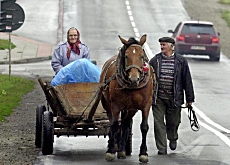
EU cohesion fund needed to cement relationship

Switzerland's relationship with the European Union could suffer if voters refuse to contribute to the EU's enlargement eastwards, says the German ambassador.
Swiss Economics Minister Joseph Deiss echoed the diplomat’s comments, criticising the rightwing Swiss People’s Party for calling for a nationwide vote on the issue.
Andreas von Stechow, Germany’s new ambassador to Switzerland, told the NZZ am Sonntag newspaper that a “no” vote to the Swiss financial contribution to the so-called EU Cohesion Fund would damage Switzerland’s reputation as a negotiating partner.
The fund has helped EU member states reduce economic and social disparities and stabilise their economies since 1994.
After the latest enlargement of the EU in 2004, the European Commission requested the Swiss make a financial contribution. Most of the ten newest EU members are former communist bloc states in eastern Europe.
Switzerland, which is not a member of the EU, pledged SFr1 billion ($760 million) to the fund after it signed a second set of bilateral accords with the Union in May 2004.
The commission has said in the past that the financial contribution had to be seen in the context of Switzerland benefiting from access to the EU’s enlarged internal market and to a number of EU programmes and activities.
“The Swiss government has been right in saying that if Switzerland was going to benefit from the EU’s enlargement to the east, then it had to offer some kind of compensation,” said von Stechow.
Challenge
The Swiss parliament approved the funding during its last session, but immediately afterwards, rightwing parties called for a nationwide vote on the issue.
The Lega dei Ticinesi group announced it would challenge the payment, followed by the far-right Swiss Democrats and the leading Swiss People’s Party.
They need to collect at least 50,000 signatures over the next three months to force a vote likely to take place next year ahead of parliamentary elections.
Economics Minister Deiss criticised the People’s Party decision to call for a ballot in an interview with the SonntagsZeitung on Sunday.
While he admits that the rightwing party had always fought against closer ties with the EU, he believes this time round its members were playing politics.
“It’s a transparent attempt to use this issue to drum up support ahead of the 2007 parliamentary elections,” he said.
Deiss added that as one of four government parties, the People’s Party was behaving irresponsibly for tactical reasons and threatening the good relationship between Switzerland and the EU.
Loss of goodwill
The minister, a centre-right Christian Democrat, said that a refusal to contribute to the EU enlargement would cost the Swiss a huge amount of goodwill in Europe. “The economic damage would be major as our companies would have to operate in an unfriendly environment,” he told the Sonntagszeitung.
According to Deiss, a refusal would also threaten a series of bilateral accords, such as the Schengen agreement on the free movement of people. “The EU or EU-member states could decide not ratify such an accord,” he added.
For the economics minister, the contribution to the EU fund is not an entry fee to new markets, but a gesture of solidarity and a defence of Switzerland’s own economic interests.
“Small gestures are sometimes important, just like an unexpected phone call or a bouquet of flowers can contribute a lot to a good relationship,” he said.
swissinfo with agencies
Switzerland has been granting financial aid to countries in eastern Europe to help them transform into market economies.
As part of the second set of bilateral treaties with Brussels, non-EU member Switzerland, pledged to provide SFr1 billion to ten new EU member states mainly in eastern Europe.
Under the accord, almost half the funding will go to Poland. Hungary will benefit to the tune of SFr131 million, while the Czech Republic will receive SFr110 million.

In compliance with the JTI standards
More: SWI swissinfo.ch certified by the Journalism Trust Initiative




























You can find an overview of ongoing debates with our journalists here . Please join us!
If you want to start a conversation about a topic raised in this article or want to report factual errors, email us at english@swissinfo.ch.